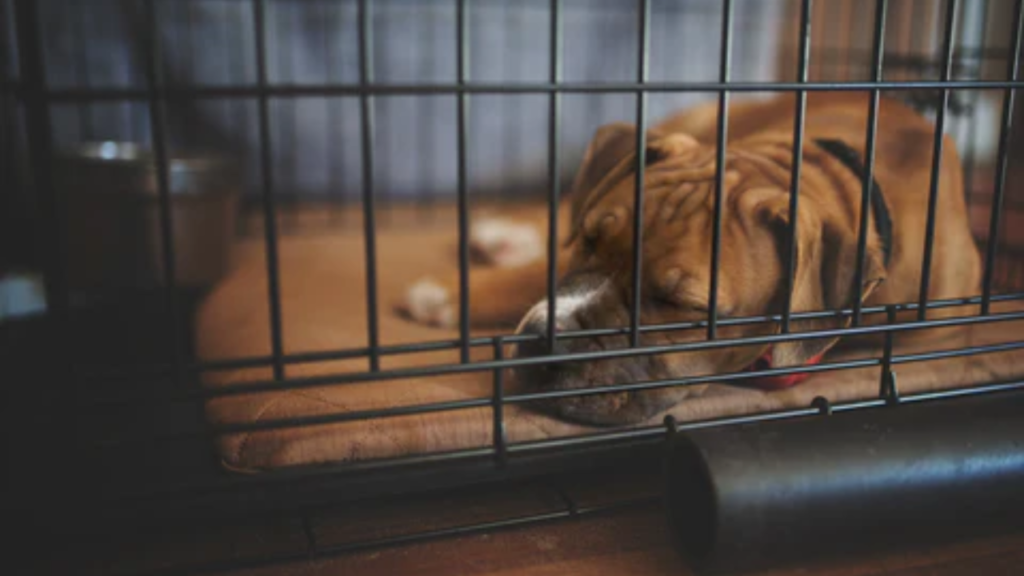Stopping dogs from barking at night could pose quite a problem for many people. Dogs bark for different reasons at nighttime-some because of anxiety, some due to loneliness, and others perhaps due to external stimuli. To provide the right solution for peaceful nights both for you and your furry friend, one must understand the core issue.
Tired of sleepless nights because of the continuous barking? Are you at a loss about how to help your dog calm down and sleep? With the right techniques, which take a little patience? You will be able to put an end to this night barking and restore tranquility in your house.
Identify what may be causing your dog to bark, whether it is noise, fear, boredom, or other factors. Set up a pattern for sleep, exercise in the form of walks, praise, and rewards for being quiet. Besides those steps, try making various calming aids available or make their sleep space cozier for long-term success.
Why Do Dogs Bark at Night?

Dogs tend to bark more at night because of quiet hours; this makes them more alert. While some amount of barking is considered normal, too much barking perturbs not only the canine but also the owner. There are few distractions at nighttime, and as a result, the pet gets to notice sounds or movements easily. That leads to being hyper-aware and causing barking.
Anxiety or boredom can also cause dogs to bark. If they have not had adequate mental and physical stimulation in the daytime, they may release this energy by barking. Sometimes, it is a cry for attention for loneliness.
1) Territorial Instincts and Alertness
Dogs are naturally communicating animals; one of the major mediums of their communication is barking. Knowing for what reason they are barking at night may help effectively deal with them. Common reasons could be for territorial instincts. Dogs might sense intruders or strange sounds that trigger their alerting system. This could be an instinct to defend their home by barking continuously.
2) Fear, Anxiety, and Loneliness
Another reason could be fear or anxiety. Some dogs are disturbed by the darkness, and being without proper light might be terribly bothering for them. Furthermore, some dogs do experience separation anxiety, and they might bark for comfort since they feel lonely without their owner being close to them.
3) Medical Issues
Medical issues can also be a factor: Pain or discomfort may cause a dog to vocalize at night. If the barking seems sudden or excessive, an appointment with a veterinarian is critical in order to rule out any health problems.
Is It Normal for Puppies to Bark at Night?

Yes, it is normal that puppies bark at night. They are still getting used to their setting, and all this makes them insecure. That is why they can bark due to a general feeling of discomfort, for attention, or to drive a point of need across.
Puppies are usually full of energy spurts and restless at night. This restlessness could be a nighttime barking mechanism to search out their environment or simply miss their littermates or mother due to the separation and may feel lonely.
It would be necessary to reassure them and let them have their comfort zone. As time progresses and they get familiar with the new home, the barking at night ought to subside. If it gets excessive, training methods and a routine can work. Keep in mind that all it takes is patience. Your puppy is growing and learning, and sooner or later, he will most probably settle down and get into a peaceful night’s routine.
Should You Ignore Your Dog Barking at Night?

The tricky part is to ignore the dog while it barks at night. This is because once you respond to it immediately, then you may be reinforcing that barking behavior; your dog may learn that barking brings attention, whether good or bad, and this becomes a nighttime barking cycle that’s hard to break.
On the other hand, setting a completely blind eye to your dog’s distress signals is not always the best thing. For instance, if your dog barks because of fear or anxiety, you do want to attend to such feelings. This may just heighten anxiety and stress if left unattended.
Second, do not dismiss the barking outright; gauge the situation. If it is to alert you of a problem, then attend to your dog. However, if this is an anxiety or loneliness problem, try to comfort or reassure him. Training can also help, like teaching your dog a “quiet” command.
Can Crate Training Help Reduce My Dogs Barking at Night?

Crate training might be a very effective tool when trying to address nighttime barking. A crate will be your dog’s safe place, where he feels secure and comfortable, since it works much like a den. This could help ease him into a night of sound sleep.
A crate can be a good place for your dog when properly introduced. Let him get used to the crate, placing treats and toys in it during the day, making it a friendly place to be. Keep increasing time inside while always making sure he is comfortable.
At night, it is a good idea to place the crate in or around your bedroom for reassurance. Your dog will still feel your presence, and the feelings of loneliness decrease. Gradually, he may learn to settle down and bark less.
However, while doing so, it is important not to use the crate as some form of punishment; this associates the crate with negative feelings, which could increase anxiety. On the contrary, use positive reinforcement to stimulate calm behavior. Patience and consistency will pay off in crate training being effective for nighttime barking and creating a peaceful sleep environment for you and your dog.
How to Stop Your Dog from Barking at Night? Pro Tips

Pro Tips
| Pro Tip # 1 | Now, nighttime barking requires a multi-faceted approach. First of all, offer positive reinforcement for being quiet. If your dog has been quiet, give them some treats or praise them. This encourages them to associate silence with positive outcomes. |
| Pro Tip # 2 | Evening walks or play sessions can also prove helpful. Exercise helps dogs release built-up energy, making it easier for them to wind down at night. A tired dog is much less likely to bark out of boredom or restlessness. |
| Pro Tip # 3 | A soothing bedtime routine can work for your dog by letting him know its sleep time. You may want to begin with relaxed playtime or just cuddling to get him into the mellow mode. |
| Pro Tip # 4 | Equally essential is giving them a restful sleeping place. Ensure that their bed is warm and positioned on a quiet spot, free from distractions. |
| Pro Tip # 5 | Some find relief in eliminating outside stimulation-noise or light. Curtains and white noise machines will help them in their sleeping quarters. |
| Final Pro Tip | Finally, calming aids: music or aromatherapy. There are several calming scents that are effective in calming anxious dogs. If the barking continues despite all efforts, do not hesitate and seek professional help from a trainer or behaviorist. |
Why Has My Dog Suddenly Started Barking at Night?

If your dog suddenly starts barking at night, then this is something on which you really need to try and find out the underlying reasons for this. A change in behavior often means that something has gone wrong. For example, if your dog’s environment or routine has changed recently, then he can feel anxious. If you have moved or perhaps added a new member to your family, then your dog may simply be reacting to that change.
Medical problems could be one more cause of sudden barking. This is their way to vocalize that they are in discomfort or pain and hence will raise the requirement for a consult from your veterinarian if the barking were to come out of the blue or be excessive.
Or maybe your dog barks because of the external stimuli. Outside stimuli-from other animals or even traffic-noises may stimulate the barking. Alert or territorial dogs may feel the compulsion to bark at perceived threats.
What Does the Law Say About Dogs Barking at Night?

Understanding the local ordinances about dogs barking is part of being a responsible owner. More often, communities have noise ordinances to keep the peace and quiet in a neighborhood. Continuous barking, sometimes especially at night, is very annoying to neighbors.
The key is to manage excessive barking proactively if your dog engages in it. Often, owners can be fined for failure to manage excessive barking, and sometimes even face legal action. Most communities expect responsible management of one’s pets, which include limiting the disturbance created.
This may at times bring in interference by the animal control in cases of disturbance created due to much barking. They are normally able to offer advice and support with ways in which you can deal with this behavioral expression. Always good things to keep your lines of communication open with your neighbors besides trying to iron out any issues that would bother them.
Conclusion
The conclusion is that your dog’s nighttime barking has an impact on your rest and their welfare. Identifying the motive for the barking, such as protective instincts or anxiety, will help you find a solution that will work well with your dog.
Reward quiet behavior with positive reinforcement. Reward your dog when he is calm. An evening walk or play session can burn off energy, making it easier for him to relax. Set up a bedtime routine to get him in a relaxed state before sleep, and make a comfortable sleeping area. Block out outside noises that disturb him.
If barking persists, one should consult professional help in the form of trainers or veterinarians. Again, it takes time and is a demanding thing for the owner since patience is required, but with correct strategies, nights can be peaceful for both you and your dog. A well-rested dog is a happy dog.

Frequently Asked Questions
1. Why do dogs bark in the night?
Answer: Anxiety, dog territorial instincts, dogs may be bored, or your dog is responding to nightly noises.
2. Is it normal for puppies to barking in the night?
Answer: Yes, since puppies bark in a position of insecurity, discomfort, or for attention.
3. Should I ignore My Dog barking at night?
Answer: That would be more complicated, because ignoring can reinforce this behavior. And you would have to bring into perspective some kind of anxiety or distress.
4. Does crate training help in minimizing nighttime barking?
Answer: Yes, crate training can provide safety and security to the dog, helping him feel that his barking isn’t called for.
5. What are some effective tips that can help stop nighttime barking?
Answer: Use reinforcement: pleasant wake-up activities, relaxing pre-sleep routine, exercise and comfortable sleeping space.
6. Why does my dog suddenly start to bark in the middle of the night?
Answer: Sudden barking might be due to changes in environment, anxiety issues, or potential medical problems. Check the cause.
7. What to Do If My Dog Barks Excessively at Night?
Answer: Look at the triggers, reassure him, and, if necessary, seek expert advice if he still barks after your interference.
8. How to create a soothing bedtime routine for your dog?
Answer: Incorporate some playtime, cuddles, and a routine which would tell him that now it’s time to sleep.
9. Can my dog be barking because of outside noises?
Answer: Yes, outside noise can trigger them to bark, especially if your dog is the alert or territorial type.
10. What does the law say for nocturnal barking dogs?
Answer: Excessive barking also triggers many areas’ noise ordinances, often serving as a source of complaint and fines.
Meta Description
Learn easy ways to prevent your dog from barking at night. Learn why dogs bark at night, plus pro techniques-positive reinforcement, calming before bed, crate training-to keeps your nights quiet.
